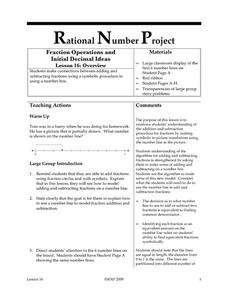Virginia Department of Education
Integers: Addition and Subtraction
Young mathematicians construct their own understanding of integers with an inquiry-based math lesson. Using colored chips to represent positive and negative numbers, children model a series of addition and subtraction problems as...
Scholastic
Study Jams! Addition with Regrouping
Zoe needs to back up her music collection, but do her friends have enough space on their computers to help? Find out as you teach your class how to add two- and three-digit numbers with regrouping. Place value is emphasized as both the...
Curated OER
Multiplication & Division
Helpful for building a multiplication unit that focuses on different strategies. With explanations about repeated addition and subtraction as foundations for multiplication, scaling, summaries of progression, and basic multiplication and...
Illustrative Mathematics
Gifts from Grandma, Variation 3
There are three money word problems in this activity, each one is set in the same context. The first asks what was the total amount grandma spent, the second how many grandchildren grandma has, and the third asks how much grandma spent...
Buffalo State
Adding and Subtracting Positive and Negative Integers
A well-rounded unit on positive and negative integers is a great addition to your middle school math class. Learners work through five activities, each focused on a different skill, before playing a Game of Life to practice the...
University of Minnesota
Fraction Operations and Initial Decimal Ideas
Add another strategy to the toolboxes of young mathematicians with this elementary math lesson plan on using number lines to add and subtract fractions.
EngageNY
Dividing by (x – a) and (x + a)
Patterns in math emerge from seemingly random places. Learners explore the patterns for factoring the sum and differences of perfect roots. Analyzing these patterns helps young mathematicians develop the polynomial identities.






